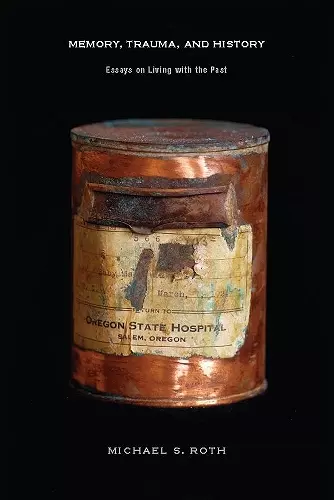Memory, Trauma, and History
Essays on Living with the Past
Format:Paperback
Publisher:Columbia University Press
Published:11th Nov '11
Currently unavailable, and unfortunately no date known when it will be back

This impressive set of essays show us the trajectory of an intellectual historian who began his career concerned with the theoretical rejection of historical meaning, moved to a consideration of the cultural practices of memory and forgetting, and then to a broad and nuanced consideration of trauma and the challenges it poses to historiography. If these essays begin with his former reflections on why historical meaning is denied, they move through a recognition of how and why searing loss makes historical meaning so difficult. Over and against a skeptical or nihilistic position, Michael S. Roth continues to clarify the values of the historical archive, visual art, and a liberal education. We witness the formidable development of a scholar whose most contemporary vocation is the passionate and persuasive defense of a liberal arts education. To read the entire book is to be reminded why we so badly need thoughtful, courageous, and broad-ranging educator-intellectuals like Roth-and that they are so rare. -- Judith Butler, University of California at Berkeley
In these essays, Michael S. Roth uses psychoanalysis to build a richer understanding of history, and then takes a more expansive conception of history to decode the cultural construction of memory. He first examines the development in nineteenth-century France of medical criteria for diagnosing memory disorders, which signal fundamental changes in the understanding of present and past. He next explores links between historical consciousness and issues relating to the psyche, including trauma and repression and hypnosis and therapy. Roth turns to the work of postmodern theorists in connection with the philosophy of history and then examines photography's capacity to capture traces of the past. He considers how we strive to be faithful to the past even when we don't care about getting it right or using it productively. Roth concludes with essays defending pragmatic and reflexive liberal education. Drawing on his experiences as a teacher and academic leader, he speaks of living with the past without being dominated by it.
Roth rules! A compulsive peeper into the corners of the historical past, he is the visual historian's historian. Not only because Roth is smart, not only because he finds odd things that captured people's attention in the past, not only because he is theoretically sophisticated without being dogmatic, but also because as a thinker and writer he is always able to engage his audience on every topic. -- Sander L. Gilman, Emory University With critical agility and grace, Roth's life-affirming and judicious work urges us to absorb the critical lessons of postmodern irony and resist the lure of cold and superior sophistication in favor of efforts to find meaning in ever renewed inquiries into who we think we are and what we want to be. -- Carolyn J. Dean, Brown University, author of Aversion and Erasure: The Fate of the Victim after the Holocaust In this excellent work, Roth provides sobering antidotes to recent hyperboles, claiming the most abject forms of victimization and trauma have recently become the ultimate forms of legitimation. A lucid, boldly interdisciplinary book, Roth's work will stimulate exchange among historians, critical theorists, literary critics, students of visual culture, and all readers concerned about the fate of liberal education. -- Dominick La Capra, Cornell University This collection revises our normal conceptions of the relation between 'history' and 'the past.' Roth's essays challenge us to rethink the links among history, psychoanalysis, philosophy, and the body. -- Hayden White, University of California, Santa Cruz exceptional and wide-ranging -- Robert Eaglestone Times Higher Education Not only does it stand out as a profound interdisciplinary study on the multilayered facets of (collective) memory and its (re)construction, but it is in itself a valuable record of contemporary discourses on memory, since its essays were written over more than twenty years. -- David Kerler Modern Language Review
ISBN: 9780231145695
Dimensions: unknown
Weight: unknown
336 pages